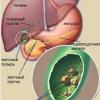Who is lohengrin and why is it important. PR in Norse mythology Wagner lohengrin content
October 13th, 2009
"The spirit of music for me is akin to the spirit of love"
Richard Wagner.
One of the most significant romantic operas, Lohengrin, first staged in 1850, was written by Richard Wagner in 1848 based on medieval German novels. The opera tells the story of Lohengrin, the knight of the Holy Grail, the son of Parsifal. Lohengrin is sent in a boat pulled by a swan to save the maiden and the kingdom, left without an heir. The hero of Lohengrin is first mentioned in the poem Parsifal by Wolfram von Eschenbach (1210), the most famous German epic of the Middle Ages, which in turn was a variation of the earlier medieval fairy tale The Swan Knight.
The first idea for the opera came to Wagner in 1842 in Paris. In the summer of 1845, while staying at a resort in Marianske Lazne, Wagner made a sketch of the opera and set about developing a libretto. In May 1846, he set to work on the music, in July of the same year the outline of the opera was worked out, the final score of the opera was completed on April 28, 1848. The premiere was delayed for two years due to difficulties in finding a theater where the opera could be staged, and also because of the May Revolution of 1849, in which Wagner was accused and expelled from the country, and he saw his opera on stage only eleven years after the premiere. However, since the premiere of this opera, Wagner's popularity has been on the rise. The first premiere of Lohengrin took place in Weimar, Germany on August 28, 1850 at the German National Theater (State Chapel). Wagner was not present at the premiere, Franz Liszt, a close friend and supporter of Wagner, took over the staging and conducting. Liszt chose the premiere date in honor of the city's most famous resident, Johann Wolfgang von Goethe, who was born on August 28, 1749. The first Russian premiere of the opera took place at the Mariinsky Theater in St. Petersburg on February 5, 1873, as part of a double program along with the premiere of three acts of Modest Mussorgsky's opera Boris Godunov.
Characters
Henry I "Birdcatcher", German King - bass
Lohengrin - tenor
Elsa of Brabant - soprano
Friedrich Telramund, Count of Brabant - baritone
Ortrud, his wife - mezzo-soprano
Royal Herald - baritone
Four Brabant nobles - two tenors, two basses
Four pages - two sopranos, two altos
Choir (Saxon and Thuringian counts and nobles. Brabant counts and nobles. Noble ladies. Pages. Warriors. Women. Servants.)
Duke Gottfried, Elsa's brother - silent role
The opera takes place in Antwerp in 933.
Act one
Plain on the banks of the Scheldt, near Antwerp. King Henry arrives in the Duchy of Brabant, where he has gathered the German tribes to expel the Hungarians from his dominions, and also to settle a dispute between two of his subjects, Count Frederick of Brabant of Telramund and Elsa of Brabant. Count Friedrich of Telramund acts as regent and guardian of the little duke Gottfried of Brabant against his sister Elsa, who is also under his guardianship, as their late father put. Elsa's brother disappeared under mysterious circumstances. Elsa went for a walk with him and returned alone, and now Friedrich, provoked by his newly-made wife Ortrud, accuses Elsa of killing her brother and demands that she give him the duchy.
Elsa appears, accompanied by her servants. She proclaims her innocence. The king appeals to the ordeal, desiring that the judgment of God be accomplished through a trial by combat. Friedrich readily agrees. When the king asks Elsa about her protector, she describes the knight she saw in a dream, falls to her knees and prays to God to send her help. Twice the herald with four trumpeters, each turned in different directions of the world, vainly called out to the unknown knight, but when Elsa called herself in fervent prayer, a miracle happened.
A boat drawn by a swan appears on the river, and in it stands a knight in shining armor. He goes ashore, releases the swan, and, having greeted the king with reverence, asks Elsa if she wants him to be her protector. Elsa knelt before him and told him that she was giving him power over herself. As payment for his services, the knight asks for only one thing - Elsa will never ask him who he is and where he came from. Elsa agrees. Frederick's men ask their master to surrender, as he cannot fight against magic, but Frederick proudly refuses, and the battlefield is immediately prepared. All present, except Ortrud, who worships her pagan gods, appeal to God to judge and grant victory to the right. A battle ensues and Friedrich is defeated, but a mysterious knight grants him life. Taking Elsa by the hand, the knight proclaims her innocence and asks for her hand in marriage. Rejoicing and praising the victory, people disperse, Ortrud and Friedrich also leave, moaning about their defeat.
Act two
On a dark night, the humiliated Friedrich and Ortrud sit on the steps of the cathedral in the courtyard of Antwerp Castle. The emaciated and outcast count is annoyed with his fate. Ortrud is preoccupied with vengeance, she hoped to restore through the accusation the power of a kind of Frisland, her family, who once ruled Brabant. Friedrich blames his wife for the disgrace he suffered, as she is the only one who claimed to have witnessed Elsa's murder of her brother, and she also awakened in him the ambition of seizing the throne. Ortrud skillfully resists all accusations. She persuades her husband to believe that it was only magic that helped the knight win, but it can be dispelled either by revealing the stranger's name or if Friedrich injures him; a drop of blood lost would be enough to render the knight exhausted.
Elsa is happy, but when she sees two unfortunate outcasts from her balcony, pity awakens in her. Friedrich is in hiding. Elsa listens to Ortrud and goes down to the yard. As she descends, Ortrud, well-versed in the affairs of magic, calls on the pagan gods Wotan and Freya for revenge and thinks up a plan for revenge. When they meet in the courtyard, Ortrud rushes to Elsa's feet and begs for forgiveness, Elsa generously forgives her and invites her to her wedding.
Gradually lightens up. On the tower two guards trumpet the dawn; they answer from a distant tower. The four trumpeters of the king come out and blow the call:
The king's herald announces to the people about the expulsion of Frederick and that the mysterious knight takes control of the Brabant region and will soon lead an army against the Hungarians. Since the knight does not want to take the rank of duke, he asks to be called the Guardian of the Edge (Schützer von Brabant) (Before the Second World War, the libretto instead of "Guardian" was "Leader", Führer).
Wedding day. In a wedding dress, Elsa appears, accompanied by her female retinue, who lead her to the cathedral. Before entering the church, Ortrud stands in the way of Elsa, declaring that it is her right, Ortrud, to go first; her respectable husband is a victim of deceit in a fake court, while Elsa does not know her husband's name, whether he has honor and is afraid to even ask him about it.
The king, knight, Saxon counts and nobles appear. The knight reprimands Ortrude, reassures Elsa, and then Friedrich appears, who had previously been hiding near the cathedral. He appeals to the king, trying to explain that God's judgment was dishonorable; with great difficulty he succeeds in persuading people to listen to him. Looking at the knight, Friedrich demands that he confess who he is and where he comes from, otherwise it will be evidence of deception. The knight refuses, only Elsa can ask him to reveal himself, but she believes him. Even despite the instigation and persuasion of Friedrich, who offers to cut off a piece of the knight’s finger so that she learns the truth, Elsa remains unshakable.
Act three
Wedding choir. Perhaps the most famous part of the opera, known as the "Wedding March", is still played at weddings in many Western countries:
Elsa and the knight are left alone in the room, confessing their love to each other, Elsa yearns to find out who he is. Confused and afraid that the swan will return and take her husband away, she breaks her promise and insistently asks him to tell about himself. At this moment, Friedrich and his retinue rush in to them. Elsa gives the sword to the knight, and he kills Friedrich with one blow, after which, horrified, Friedrich's associates drop their weapons and fall to their knees. The deeply shocked knight orders the nobles to take the corpse to the court of the king, and the women who arrive dress Elsa and take her to the same place where he will reveal his secret. It's getting light.
The king with his people is standing on the banks of the Scheldt River, waiting to go on a campaign. Frederick's corpse is brought; the mysterious knight tells the king about the attack on himself and says that he cannot lead the warriors into battle. After that, he reveals who he is. His name is Lohengrin, he is the son of King Parsifal and the guardian of the Holy Grail. The Cup of the Last Vespers endows the knights guarding it with unearthly power. Even when they go to other lands to fight for truth and honor, this force is with them so far no one knows who they are.
Lohengrin has opened, and the Grail demands its return. Despite all the persuasion of the warriors and Elsa, Lohengrin heads to the shore, where a boat drawn by a swan is already waiting for him. Ortrud appears and thanks Elsa for getting rid of Lohengrin. Then she informs that the swan is in fact none other than Gottfried, Elsa's brother, whom she has bewitched and who must now leave this land forever, remaining a swan for life. Lohengrin hears all this and kneels in prayer. Then the white dove of the Grail appears in the sky, the swan hides in the waters of the river, and instead of him, a boy appears from the water - Gottfried in a sparkling robe. Lohengrin quickly jumps into the boat, which is taken away by the dove, grabbing the chain. The Brabantines kneel respectfully before Gottfried. Elsa watches as Lohengrin, led by a dove, moves away over the horizon. She falls dead into her brother's arms.
Opera history
According to Wagner himself, the Christian motifs of the Lohengrin legend were alien to him. The composer saw in her the embodiment of eternal human aspirations for happiness and sincere, selfless love. The tragic loneliness of Lohengrin reminded the composer of his own fate - the fate of an artist who brings people high ideals of truth and beauty, but meets with misunderstanding, envy and malice.
It was only after the immediate impression of reading had faded that the image of Lohengrin began to appear again and again, becoming more and more attractive, at the forefront of my soul. And the power of the image increased outwardly as soon as I got acquainted with the myth of Lohengrin in its simpler form, in which, despite the simplicity, the meaning was deeper - in the form of a folk tale, and with how this myth proceeded from this state, through transformations, into today's traditional knowledge of myths. After I saw in it a pious tale of piercing human aspirations, the core of which was not limited to the Christian craving for the supernatural, this image began to become more and more close to me.
Richard Wagner
What is really the most characteristic thing in human nature, to which does the striving for the unattainable return as the only possible source of satisfaction? This is the need for love, and the distinguishing feature of this love in its most essential manifestation is the desire for absolute sensible reality, for the pleasure derived from an object that can be comprehended by all senses, and which could be completely and forever surrounded by all the power of real being.
Richard Wagner Franz Liszt
Immediately after finishing writing Lohengrin, feeling the pressure of everyday circumstances, Wagner decided to come to grips with the distribution of his operas in Germany. At that time, his operas were not particularly successful. The last opera, Tannhäuser, although slowly gaining popularity, was only in Dresden, which did not affect other cities in any way. Wagner turned his attention to Berlin as the only place that could influence German theaters. In Berlin, one should have started with some older and more famous opera, but Tannhäuser was rejected by the Berlin theater as too epic, Rienzi, which was successful in Dresden, also failed in Berlin, mainly due to the mediocrity of the main tenor. Problems with theaters and critics dragged on. Wagner, implicated in the failed May Revolution of 1849, was forced to leave his post as conductor at the Dresden Opera and leave Germany. Wagner lived in exile for many years.
Dear friend, I have just been looking through the score of Lohengrin. I rarely read my own work. A great desire suddenly seized me that this opera should be performed. I address this desire to your heart:
Put on my Lohengrin! You are the only one I can pray for; except you, I can not entrust this production to anyone; I give it to you with joy and confidence. Put it where you like, even if only in Weimar; I am sure that you will provide all the necessary and possible means, and nothing will be refused to you. Put on "Lohengrin" and let its existence be your business!
Franz Liszt readily agreed to help a friend. Communication and preparation for the production went through correspondence. Sketches of scenery Wagner drew himself and sent them to Liszt. Also, the composer, being confident in the integrity of his opera (which was confirmed later): the successful and perfect connection of music with words and action, asked Liszt to stage it as it is, without adding or cutting anything. There were only minor adjustments by Wagner. In a letter to Liszt dated July 2 from the Swiss Thun, Wagner requested that the final aria of Lohengrin be shortened by 56 bars, and now it ends with the words "ich bin Lohengrin genannt". Wagner also asked to organize the sale of the libretto and help him attend the premiere incognito.
From a letter from Liszt to Wagner, mid-July 1850:
Lohengrin will be put on special conditions conducive to success. Two thousand thalers will go to the production, an amount hitherto unheard of in Weimar. Journalists are also not forgotten, articles will be published in selected newspapers. I take over auditions for pianists, strings, choir and orchestra. The premiere will take place on the day of Goethe's anniversary, August 28th, and three days earlier, on the 25th, there will also be an open monument to Herder. Thanks to these two events, the city will have a lot of people, including from the upper strata of society. All this should help the success of the opera.
After two premieres in a row, the theater will be closed for the next month, and a new production of Lohengrin will take place closer to winter. As for your coming to the premiere, with pain in my heart I have to disappoint you, your return to Germany is absolutely impossible.
On August 16th, by letter from Zurich, Wagner gave further instructions for several adjustments to the score, mainly regarding tempos. On the evening of August 28, Wagner and his wife Minna spent in Lucerne at the Schwan Hotel. The news that came after the premiere contained nothing clear, nothing reassuring; they said that in general the opera made a good impression on the audience. But only Liszt's letter to Wagner earned the latter's trust:
Your Lohengrin is the greatest work from start to finish. My heart cried several times. The opera as a whole is an indivisible miracle, I cannot count the number of passages, combinations, effects... The duet of Elsa and Lohengrin in the third act is, in my opinion, the culmination of true art in all its glory.
Our first impression was good enough. The count and a few intelligent people in Weimar are full of sympathy and admiration for your work, and as for the public at large, they are compelled to admire and applaud what they do not understand.
You can be quite sure of the fate of a masterpiece in Weimar, where you are no doubt a little surprised by the ability to stage such things. Until the end of winter, Lohengrin will definitely become the “bait” of the theater.
The second production of your masterpiece met my expectations, and the third and fourth will confirm everyone in the opinion that I expressed as soon as we began listening to Lohengrin, namely, that this work will bestow upon the public, becoming worthy of understanding and deserving of the pleasure of more respect than that given by any amount of applause from the public.
"Down with all this theatrical dirt!" - I exclaimed when we auditioned the first scenes of the opera, - "Down with all this critical rubbish and routine among artists and the public!" Finally, in the end, I can assure you with full confidence that your work will be better performed, heard and understood with each production. With regard to the latter, understanding, this is, in my opinion, the most important, since it is not only about the singers and the orchestra, who serve only as instruments in the revolution of drama, but also, and above all, about the audience, which must be raised to a level where it can, through sympathy and sound understanding, associate itself with an understanding of a higher order than that laid down by the indolent entertainments with which it feeds its imagination and sensibility every day in our theaters.
This must be done, and if necessary, by force; as they say in the Gospel, the kingdom of heaven is subjected to violence, and only those who use violence take possession of it.
I began to write some notes on what we had heard about the operas Tannhäuser and Lohengrin; but in the process I became convinced of the impossibility of expressing myself fully. In this regard, I could continue to write endlessly. If you take the time to read this, I will be grateful. I would just like to add a few words. From the first day I heard your music, I constantly say to myself, especially in sad moments: "If only I could hear a little Wagner today." No doubt there are many like me. Ultimately, you can be satisfied with an audience whose flair bridges gaps in journalists' knowledge. Why don't you give more concerts with new works? You whetted our appetite for new experiences; do you have the right to withhold the rest from us? - Thank you again, dear; in difficult moments you helped me to remember myself and great things in general.
Charles Baudelaire, French poet, Wagner
As soon as the creative force took possession of him, history turned into soft clay in his hands. Then he immediately becomes in a different relationship with her than any scientist. And precisely because she was even more submissive and obedient to him than any dream, he could put into a single event the typicality of entire epochs and in this way achieve the truthfulness of the image, inaccessible to the historian. Where was the flesh and spirit of the knightly Middle Ages so conveyed in images, as is done in Lohengrin?
Lohengrin contains a solemn warning against research and questioning. Wagner defends with this the Christian concept "you must and must believe."
The prologue to Lohengrin provided the first, only too risky, too successful example of how music can also hypnotize.
Yesterday was Sunday. As a reward for allowing himself to be tormented by Mr. Brecht for several days in a row, his mother took him to the City Theater to listen to Lohengrin. The thought of this evening filled his heart with joy for a whole week. He was annoyed only by the fact that this time, as always, such a celebration was preceded by a lot of troubles that darkened the happiness of waiting. But on Saturday, the school week finally ended, and the drill buzzed angrily in his mouth for the last time. Now everything is over, and he, without hesitation, postponed the lessons until Monday. And what does Monday even mean? Will he ever come? And how can anyone believe on Monday who is going to listen to Lohengrin on Sunday evening?
R. Wagner "Lohengrin"
Opera in three acts
Libretto by R. Wagner
The opera "Lohengrin" is the second work of the composer, who by this time had already created the first masterpiece of musical drama - the opera "Tannhäuser". In the 40s, Wagner actively studied medieval legends, French traditions and Germanic myths. In the summer of 1845, in Carlsbad, Wagner makes the first draft of Lohengrin. The composer's attention was drawn to the image of a knight with a swan. There are many versions of the legend that tells that a beautiful and virtuous stranger comes to people from somewhere. He conquers everyone with his irresistible charm, but if people try to find out the secret of his appearance, he disappears. Wagner gives his interpretation of this legend: “Lohengrin was looking for a woman who would believe in him, would not ask who he was, but would love him the way he is without any conditions ... He would like to free himself from loneliness through brotherly love and love-passion, and therefore strove for a woman - for a human heart. But he cannot free himself from his true nature, he is doomed to bear the stamp of the miraculous. He arouses envy, and even doubts and jealousy are born in the heart of a loving woman. Lohengrin does not achieve perfect understanding, is forced to confess his divine essence and return to his lonely abode. Wagner introduces the problem of personality, the problem of the creator into the content of the folk legend. It takes Wagner two years to develop the libretto, then a whole year to write the score. The production had to wait another three years. Only at the insistence of F. Liszt "Lohengrin" in 1850 was staged in Weimar.
Absolutely all musical and dramatic means were used in the creation of the drama. The complexity of the score and the fantastic diversity of the orchestra are amazing. It was impossible for the singers to show off a virtuoso aria - in Wagner's music everything is woven together: both the voice and the orchestra.
Plot:
The action takes place in Antwerp, in a castle on the banks of the Scheldt River, in the first half of the 10th century.
In the ancient land of Brabant, the German king Henry I the Fowler welcomes the local nobility. The king is going on a campaign against the Hungarians and he needs the knights of Brabant. In Brabant itself there is strife. The old duke had recently died and left two children: Elsa and little Gottfried. Count Friedrich Telramund became the guardian, Elsa was appointed to his wife. But Telramund appears before the king with an accusation: Elsa walked with her brother and killed him. Therefore, he, Telramund, took Ortrud, the daughter of the Frisian duke, as his wife, and now demands power over Brabant.
Elsa is brought in, shocked by this accusation. To the questions of the king, she replies that she agrees to stand before the court of God according to custom. Let the knight's sword decide if she's guilty. In a dream, she saw a knight in shining armor and hopes for his protection. The herald challenges the opponents to a duel. Two calls go unanswered. Elsa falls to her knees and prays. But then the crowd gets excited: a boat drawn by a swan approaches along the waters of the Scheldt and in it stands a radiant knight clad in silver armor. He says he came to protect the innocent. The knight asks Elsa to be his wife if he emerges victorious, and warns her in deep earnestness that she must not ask him who he is or where he came from. Elsa swears.
The fight between Lohengrin and Telramund is very short. Lohengrin defeats the enemy and leaves him life. Knights honor the winner. Ortrud and Telramund are plotting revenge.
The royal herald informs everyone of Telramund's exile. An unknown knight marries Elsa and receives the throne of Brabant. A brilliant wedding procession enters the stage. To the sounds of the organ, the young people enter the temple.
In nuptial peace Lohengrin and Elsa. She demands that Lohengrin reveal himself to her. The fatal question was raised. At this moment, Telramund bursts into the bedroom with the knights.
Lohengrin strikes him to death with one blow.
The sun rises over the Scheldt. The king is again on the judicial throne under the ancient oak. Elsa and Lohengrin arrive, the servants bring in the body of Telramund. Lohengrin reveals that he killed him in self-defense. Elsa broke her oath and now Lohengrin tells everyone that he is the messenger of the Grail and is called upon to protect all the innocent. From the Grail (divine realm) he received miraculous power, but it only works when no one knows his name and origin. If he calls himself, then he must return to his homeland. His name is Lohengrin, he is the son of King Parsifal.
A boat drawn by a swan is approaching. Then Ortrud appears and declares that the swan is Gottfried, Elsa's brother, whom she, Ortrud, has bewitched. Lohengrin kneels down and prays. As a sign that the prayer has been heard, a dove flies from heaven. The swan turns into Gottfried, Ortrud falls dead, Elsa, stricken with grief, falls to the ground.
The boat with Lohengrin quickly glides along the waters of the river, it is attracted by a dove, the messenger of heaven.
Lohengrin (opera)
| Lohengrin | |
| Lohengrin | |
Arrival of Lohengrin. Postcard |
|
| Composer | |
|---|---|
| Authors) libretto |
Richard Wagner |
| Plot Source |
medieval legends |
| Genre |
musical drama |
| Number of actions | |
| Year of creation | |
| First production | |
| Place of first performance | |
Place and time of action: Antwerp, Brabant, early 10th century
Duration around 4 o'clock
History of creation
Interest in the plot arose from Wagner in Paris. The Knights of the Grail are mentioned in many sources with which the composer was familiar - in the epic of Wolfram von Eschenbach "Parzival" (Lohengrin - the son of Parzival), in "German Tales" by the Brothers Grimm, a medieval novel about the Swan Knight, etc. On the basis of disparate legends, Wagner created an independent work, the central conflict of which is based on the meeting of the Christian worldview characteristic of the early Middle Ages and preserved paganism. The libretto was written in the city, the music was created in - years (the score was completed on April 28). The premiere was planned at the Dresden Opera, but due to Wagner's participation in the May Uprising, it was canceled.
Premiere Lohengrina took place on August 28 at the Court Theater in Weimar under the direction of Franz Liszt (Wagner was hiding in Switzerland at that time). The premiere was attended by Karl Beck (Lohengrin), Rosa Agatha von Milde (Elsa), Theodor von Milde (Friedrich). The author himself was able to hear his opera for the first time only on May 15, 1861 in Vienna. The first production of "Lohengrin" as part of the Bayreuth Festival took place in St.
Characters
- Heinrich Birder(Heinrich der Vogler), German king (bass)
- Elsa of Brabant(Elsa von Brabant) (soprano)
- Friedrich von Telramund(Friedrich von Telramund), Count of Brabant (baritone)
- Ortrud(Ortrud), his wife, daughter of a Frisian prince (mezzo-soprano or soprano)
- royal herald(baritone)
- Four Brabant nobles (tenors and basses)
- Four pages (soprano and alto)
- Gottfried(Gottfried), Elsa's brother (no speeches)
- Chorus: Brabant and Saxon nobles, retinue, servants.
Summary
First act
Shore of the Scheldt. The herald announces the arrival of King Henry, who is gathering troops throughout Germany. Friedrich turns to the king and says that after the death of the Duke of Brabant, he took over custody of the Duke's children - Elsa and Gottfried, who soon disappeared. Friedrich accuses Elsa of killing her brother and himself claims to power, especially since his wife Ortrud comes from a family that once ruled in this area.
Elsa appears, excuses are expected from her, but she behaves strangely and still dreams about the knight who appeared to her in a dream. "God's judgment" is appointed. Elsa is sure that a God-sent knight will appear to protect her. Herold asks if there is anyone who wants to take Elsa's place at the trial. When there is no hope left, a boat appears on the river, harnessed by a swan, and in it an unfamiliar knight (Lohengrin). He is ready to side with Elsa and asks for her hand, on the condition that she never asks who he is and where he came from. A duel takes place in which Lohengrin defeats Friedrich, but grants him life. Universal rejoicing.
Second act
Friedrich mourns the loss of his honor, which doomed him to exile, and reproaches Ortrud for making him falsely accuse Elsa, while Elsa is innocent - this was proved by God's judgment. Ortrud accuses him of cowardice and says that it was not God on Lohengrin's side, but sorcery, which will dissipate if you deprive him of even the slightest part of his body. It is necessary to convince Elsa to ask the hero about his origin, then he will lose his strength, and Frederick's honor will be restored.
Elsa appears on the balcony, intoxicated with her happiness. Ortrud pretends to be repentant and seeks the compassion of Elsa, who introduces her into her retinue. Ortrud tries to sow doubts in the girl's soul about her fiancé.
Morning. Herold announces the exile of Friedrich and the wedding of Elsa and Lohengrin, who is to lead the military campaign the next day. The four nobles are unhappy that they will have to go on a campaign, and Frederick, who appears, manages to persuade them to his side.
Elsa's procession approaches the cathedral. Suddenly, Ortrud blocks her passage and demands superiority on the grounds that she comes from a respected family, and Elsa does not even know who her fiancé is. After the appearance of the king and Lohengrin, Ortrud is forced to retreat. Then Telramund appears, he manages to call the indignant people to attention. Friedrich accuses Lohengrin of witchcraft, but the charge is dismissed. The procession enters the cathedral. Despite the restoration of order, doubt arises in Elsa's soul.
Third act
The wedding of Elsa and Lohengrin is celebrated magnificently. The choir glorifies the newlyweds. When the guests leave, Elsa expresses her doubts to Lohengrin. The assurances of the latter in his high origin frighten her even more - she is afraid that one day he will leave her and return to his country. In the end, Elsa directly asks him the fatal question. At that moment Friedrich sneaks up with his accomplices and attacks Lohengrin, but Lohengrin kills him.
Morning. With a large gathering of people, Lohengrin informs the king that he will not be able to lead the campaign. He is forced to tell about his origin - he is one of the knights of the Grail. Since Elsa broke her promise and showed distrust, he is forced to leave her. Lohengrin says that if he could stay even for a year, her brother would return to Elsa. A swan with a boat is approaching. Ortrud, confident in her victory, reports that this swan is Gottfried, bewitched by her. After Lohengrin's prayer, the swan takes on a human form before the time limit expires. The Grail Knight retires. Elsa dies of grief.
The asteroid (182) Elsa, discovered in 1878, is named after Elsa.
Featured entries
(soloists are given in the following order: Lohengrin, Elsa, Ortrud, Telramund)
- 1942 - Dir. Robert Heger; soloists: Franz Völker, Maria Müller, Margaret Klose, Jaro Prochazka; orchestra of the Berlin State Opera.
- 1943 - Dir. Erich Leinsdorf; soloists: Lauritz Melchior, Astrid Varnay, Kerstin Torborg, Julius Hühn; Metropolitan Opera Orchestra.
- 1949 - Dir. Samuil Samosud; soloists: Ivan Kozlovsky, Elizaveta Shumskaya, Evgenia Smolenskaya, Ilya Bogdanov; choir and orchestra of the Bolshoi Theater of the USSR.
- 1952 - Dir. Eugen Jochum; soloists: Lorenz Feenberger, Anneliese Kupper, Helena Braun, Ferdinand Franz; Symphony Orchestra of the Bavarian Radio.
- 1954 - Dir. Eugen Jochum; soloists: Wolfgang Windgassen, Birgit Nilsson, Astrid Warnay, Hermann Uhde; Orchestra of the Bayreuth Festival.
- 1962 - Dir. Wolfgang Sawallisch; soloists: Jess Thomas, Anya Silya, Astrid Varnay, Ramon Vinay; Orchestra of the Bayreuth Festival.
- 1962-63 - Dir. Rudolf Kempe; soloists: Jess Thomas, Elisabeth Grummer, Christa Ludwig, Dietrich Fischer-Dieskau; Vienna Philharmonic Orchestra.
- 1966 - Dir. Silvio Varviso; soloists: Nikolai Gedda, Ose Nordmo-Löwberg, Barbro Erickson, Rolf Jupiter; chorus and orchestra of the Royal Opera House in Stockholm.
- 1975-81 - Dir. Herbert von Karajan; soloists: Rene Kollo, Anna Tomova-Sintov, Dunya Veitsovich, Sigmund Nimsgern; Berlin Philharmonic Orchestra.
- 1991-92 - Conductor. Claudio Abbado; soloists: Siegfried Yeruzalem, Cheryl Studer, Waltraud Mayer, Hartmut Welker; Vienna Philharmonic Orchestra.
In astronomy
Asteroid 551 Ortrud named after Richard Wagner's heroine Ortrud (English) Russian opened in 1904.
Links
- Danish director Kasper Holten presented a new production of Wagner on the Russian stage
| Works by Richard Wagner | ||
|---|---|---|
| Early works | Symphony Poland (overture) Fairy's wedding Rienzi Faust's wedding (overture) |  |
| mature works | ||
LOENGRIN
Romantic opera in three acts (four scenes)
Characters:
Counts, knights, ladies, pages, servants, people.
The action takes place in Antwerp in the first half X century.
HISTORY OF CREATION
Wagner met the legend of Lohengrin in 1841, but only in 1845 did he sketch out the text. The following year, work began on the music.
A year later, the opera was completed in clavier, and in March 1848 the score was ready. The premiere scheduled in Dresden did not take place due to revolutionary events. The production was carried out thanks to the efforts of F. Liszt and under his direction two years later, on August 28, 1850 in Weimar. Wagner saw his opera on stage only eleven years after the premiere.
The plot of Lohengrin is based on various folk tales, freely interpreted by Wagner. In coastal countries, among peoples living along the banks of large rivers, poetic legends about a knight sailing in a boat drawn by a swan are widespread. He appears at the moment when a girl or a widow, abandoned and persecuted by everyone, is in mortal danger. The knight frees the girl from her enemies and marries her. They live happily for many years, but suddenly the swan returns, and the stranger disappears as mysteriously as he appeared. Often, "swan" legends were intertwined with tales of the Holy Grail. The unknown knight then turned out to be the son of Parsifal, the king of the Grail, who united around him the heroes who guard the mysterious treasure, which gives them miraculous strength in the fight against evil and injustice. Sometimes legendary events were transferred to a certain historical era - to the reign of Henry I Ptitselov (919-936).
The legends of Lohengrin inspired many medieval poets, one of them is Wolfram Eschenbach, whom Wagner brought out in his Tannhäuser.
According to Wagner himself, the Christian motifs of the legend of Lohengrin were alien to him. The composer saw in her the embodiment of eternal human aspirations for happiness and sincere, selfless love. The tragic loneliness of Lohengrin reminded the composer of his own fate - the fate of an artist who brings people high ideals of truth and beauty, but meets with misunderstanding, envy and malice.
And in other heroes, Wagner's tales were attracted by living human features. Elsa, saved by Lohengrin, with her naive, simple soul, seemed to the composer the embodiment of the elemental power of the national spirit. She is opposed to the figure of the evil and vindictive Ortrud, the personification of everything inert, reactionary. In individual replicas of the characters, in side episodes of the opera, one can feel the breath of the era when Lohengrin was created: echoes of the hopes and aspirations of the advanced people of Germany in the 1840s are heard in the king’s calls for unity, in Lohengrin’s readiness to defend his homeland and his faith in the coming victory. Such an interpretation of ancient legends is typical of Wagner. Myths and legends were for him the embodiment of deep and eternal folk wisdom, in which the composer was looking for an answer to the questions of his time that worried him.
MUSIC
Lohengrin is one of Wagner's most complete and perfect operas. It reveals with great fullness the rich spiritual world, the complex experiences of the characters. The opera vividly depicts a sharp, irreconcilable clash of the forces of good and truth, embodied in the images of Lohengrin, Elsa, the people, and dark forces, personified by the gloomy figures of Friedrich and Ortrud. The music of the opera is distinguished by rare poetry, sublime spiritualized lyricism.
This is already evident in the orchestral introduction, where a vision of the beautiful kingdom of the Grail arises in the transparent sound of the violins - the country of an unrealizable dream.
In the first act, the free alternation of solo and choral siena is permeated with an ever-increasing dramatic tension. Elsa's story "I remember how I prayed, grieving my soul" conveys the fragile, pure nature of the dreamy, enthusiastic heroine. The chivalrous image of Lohengrin is revealed in the solemnly sublime farewell to the swan "Swim back, O my swan." The quintet with the choir captures the concentrated meditation that engulfed those present. The act ends with a large ensemble, in the joyful jubilation of which the angry remarks of Friedrich and Ortrud are drowned.
The second act is full of sharp contrasts. Its beginning is shrouded in an ominous twilight, an atmosphere of evil machinations, which is opposed by the bright characterization of Elsa. In the second half of the act there is a lot of bright sunlight, movement. Everyday scenes - the awakening of the castle, warlike choirs of knights, a solemn wedding procession - serve as a colorful backdrop for the dramatic collision between Elsa and Ortrud. Elsa's small arioso "Oh light-winged wind" is warmed by joyful hope, trembling expectation of happiness. The subsequent dialogue emphasizes the dissimilarity of the heroines: Ortrud's appeal to the pagan gods has a passionate, pathetic character, Elsa's speech is permeated with cordiality and warmth. The extended ensemble scene of the dispute between Ortrud and Elsa at the cathedral - Ortrud's vicious slanders and Elsa's hot, excited speech - impresses with dynamic mood swings. A large build-up leads to a powerful quintet with a choir.
There are two scenes in the third act. The first is entirely devoted to the psychological drama of Elsa and Lohengrin. In the center of her love duet. In the second large place is occupied by mass scenes. A brilliant orchestral interlude introduces you to the lively atmosphere of the wedding feast with militant cries, the sound of weapons and ingenuous melodies. The wedding choir "Joyful Day" is full of jubilation. The dialogue between Lohengrin and Elsa "A heart tenderly burns with a wondrous fire" is one of the best episodes of the opera; wide flexible lyrical melodies with amazing depth convey a change of feelings - from intoxication with happiness to collision and catastrophe.
The second painting opens with a colorful orchestral intermezzo built on the roll call of the trumpets. In Lohengrin's story "In a foreign land, in a distant mountainous kingdom", a transparent melody draws a majestic bright image of the messenger of the Grail. This characterization is complemented by a dramatic farewell "Oh my swan" and a mournful, impetuous appeal to Elsa.
|
lohengrin opera download, lohengrin opera browser
Richard Wagner
"Lohengrin"(German: Lohengrin) - an opera by Richard Wagner (WWV 75) in three acts, to his own libretto. The premiere took place on 28 August 1850 at the Weimar Opera House.
- 1 General information
- 2 History of creation
- 3 Characters
- 4 Summary
- 4.1 First act
- 4.2 Second act
- 4.3 Third act
- 5 Featured recordings
- 6 astronomy
- 7 See also
- 8 Links
General information
Romantic opera in three acts.
Libretto Richard Wagner. (Translated into Russian by musicologist Konstantin Zvantsov).
Place and time of action: Antwerp, Brabant, early 10th century.
Duration around 4 o'clock
History of creation
Interest in the plot arose from Wagner in 1842 in Paris. The Knights of the Grail are mentioned in many sources with which the composer was familiar - in the epic of Wolfram von Eschenbach "Parzival" (Lohengrin - the son of Parzival), in the "German Tales" of the Brothers Grimm, the medieval novel about the Swan Knight, etc. emerging paganism. The libretto was written in 1845, the music was created in 1846-48 (the score was completed on April 28). The premiere was planned at the Dresden Opera, but due to Wagner's participation in the May Uprising of 1849, it was cancelled.
Premiere Lohengrina took place on August 28, 1850 at the Court Theater in Weimar under the direction of Franz Liszt (Wagner was hiding in Switzerland at that time). the premiere was attended by Karl Beck (Lohengrin), Rosa Agatha von Milde (Elsa), Theodor von Milde (Friedrich). The author himself was able to hear his opera for the first time only on May 15, 1861 in Vienna. The first production of Lohengrin at the Bayreuth Festival took place in 1894.
Characters
I. I. Golikov. Leonid Sobinov as Lohengrin (1932)- Heinrich der Vogler, King of Germany (bass)
- Lohengrin, Grail Knight (tenor)
- Elsa von Brabant (soprano)
- Friedrich von Telramund, Count of Brabant (baritone)
- Ortrud, his wife, daughter of a Frisian prince (mezzo-soprano or soprano)
- Royal Herald (baritone)
- Four Brabant nobles (tenors and basses)
- Four pages (soprano and alto)
- Gottfried, Elsa's brother (no speeches)
- Chorus: Brabant and Saxon nobles, retinue, servants.
The action takes place at a duel in which Lohengrin defeats Friedrich.
First act
Shore of the Scheldt. The herald announces the arrival of King Henry, who is gathering troops throughout Germany. Friedrich turns to the king and says that after the death of the Duke of Brabant, he took over custody of the Duke's children - Elsa and Gottfried, who soon disappeared. Friedrich accuses Elsa of killing her brother and himself claims to power, especially since his wife Ortrud comes from a family that once ruled in this area.
Elsa appears, excuses are expected from her, but she behaves strangely and still dreams about the knight who appeared to her in a dream. "God's judgment" is appointed. Elsa is sure that a God-sent knight will appear to protect her. Herold asks if there is anyone who wants to take Elsa's place at the trial. When there is no hope left, a boat appears on the river, harnessed by a swan, and in it an unfamiliar knight (Lohengrin). He is ready to side with Elsa and asks for her hand, on the condition that she never asks who he is and where he came from. A duel takes place in which Lohengrin defeats Friedrich, but grants him life. Universal rejoicing.
Second act
Friedrich mourns the loss of his honor, which doomed him to exile, and reproaches Ortrud for making him falsely accuse Elsa, while Elsa is innocent - this was proved by God's judgment. Ortrud accuses him of cowardice and says that it was not God on Lohengrin's side, but sorcery, which will dissipate if you deprive him of even the slightest part of his body. It is necessary to convince Elsa to ask the hero about his origin, then he will lose his strength, and Frederick's honor will be restored.
Elsa appears on the balcony, intoxicated with her happiness. Ortrud pretends to be repentant and seeks the compassion of Elsa, who introduces her into her retinue. Ortrud tries to sow doubts in the girl's soul about her fiancé.
Morning. Herold announces the exile of Friedrich and the wedding of Elsa and Lohengrin, who is to lead the military campaign the next day. The four nobles are unhappy that they will have to go on a campaign, and Frederick, who appears, manages to persuade them to his side.
Elsa's procession approaches the cathedral. Suddenly, Ortrud blocks her passage and demands superiority on the grounds that she comes from a respected family, and Elsa does not even know who her fiancé is. After the appearance of the king and Lohengrin, Ortrud is forced to retreat. Then Telramund appears, he manages to call the indignant people to attention. Friedrich accuses Lohengrin of witchcraft, but the charge is dismissed. The procession enters the cathedral. Despite the restoration of order, doubt arises in Elsa's soul.
Illustration for the 3rd act of "Lohengrin"
Third act
The wedding of Elsa and Lohengrin is celebrated magnificently. The choir glorifies the newlyweds. When the guests leave, Elsa expresses her doubts to Lohengrin. The assurances of the latter in his high origin frighten her even more - she is afraid that one day he will leave her and return to his country. in the end, Elsa directly asks him the fatal question. this moment Friedrich sneaks up with his accomplices and attacks Lohengrin, but Lohengrin kills him.
Morning. With a large gathering of people, Lohengrin informs the king that he will not be able to lead the campaign. He is forced to tell about his origin - he is one of the knights of the Grail. Since Elsa broke her promise and showed distrust, he is forced to leave her. Lohengrin says that if he could stay even for a year, her brother would return to Elsa. A swan with a boat is approaching. Ortrud, confident in her victory, reports that this swan is Gottfried, bewitched by her. After Lohengrin's prayer, the swan takes on a human form before the time limit expires. The Grail Knight retires. Elsa dies of grief.
Featured entries
(soloists are given in the following order: Lohengrin, Elsa, Ortrud, Telramund, Heinrich)
- 1935 - Dir. Arthur Bodansky; soloists: Lauritz Melchior, Lotta Lehman, Marjorie Lawrence, Friedrich Schorr, Emanuel Liszt; Metropolitan Opera Orchestra.
- 1942 - Dir. Robert Heger; soloists: Franz Völker, Maria Müller, Margaret Klose, Jaro Prochaska, Ludwig Hoffmann; Orchestra of the Berlin State Opera.
- 1949 - Dir. Samuil Samosud; soloists: Ivan Kozlovsky, Elizaveta Shumskaya, Evgenia Smolenskaya, Ilya Bogdanov, Gennady Troitsky; Orchestra of the All-Union Radio.
- 1952 - Dir. Eugen Jochum; soloists: Lorenz Feenberger, Annelise Kupper, Helena Braun, Ferdinand Franz, Otto von Rohr; Symphony Orchestra of the Bavarian Radio.
- 1953 - Dir. Josef Keilbert; soloists: Wolfgang Windgassen, Eleanor Steber, Astrid Warnay, Hermann Uhde, Josef Greindl; Orchestra of the Bayreuth Festival.
- 1962-63 - Dir. Rudolf Kempe; soloists: Jess Thomas, Elisabeth Grummer, Christa Ludwig, Dietrich Fischer-Dieskau, Gottlob Frick; Vienna Philharmonic Orchestra.
- 1966 - Dir. Silvio Varviso; soloists: Nikolai Gedda, Ose Nordmo Löwberg, Barbro Erickson, Rolf Jupiter, Bengt Rundgren; chorus and orchestra of the Royal Opera House in Stockholm.
- 1975-81 - Dir. Herbert von Karajan; soloists: Rene Collo, Anna Tomova-Sintov, Dunya Veitsovich, Sigmund Nimsgern, Karl Ridderbusch; Berlin Philharmonic Orchestra.
- 1991-92 - Conductor. Claudio Abbado; soloists: Siegfried Yeruzalem, Cheryl Studer, Waltraud Mayer, Hartmut Welker, Kurt Moll; Vienna Philharmonic Orchestra.
In astronomy
In honor of the heroine of Richard Wagner's opera Ortrud, the asteroid (551) Ortrud, discovered in 1904, is named.
The asteroid (182) Elsa, discovered in 1878, is named after Elsa.
see also
wedding choir
Links
- Danish director Kasper Holten presented a new production of Wagner on the Russian stage
- Libretto
- Detailed information in German
- Postcards on the topic "Lohengrin"
- Wagner "Lohengrin", plot sources
- beliefs and motives in Wagner's Lohengrin
lohengrin opera browser, lohengrin opera vpn, lohengrin opera carmen, lohengrin opera download
Lohengrin (opera) Information About
Read also...
- Why does osteochondrosis occur and how is it treated?
- What to do if a foreign body gets into the nose of a child?
- Can cystic mastopathy go away on its own? Can mastopathy go away without treatment?
- Scabies sick leave. Scabies. New conversations about an old ailment How long does itching last after scabies treatment



















